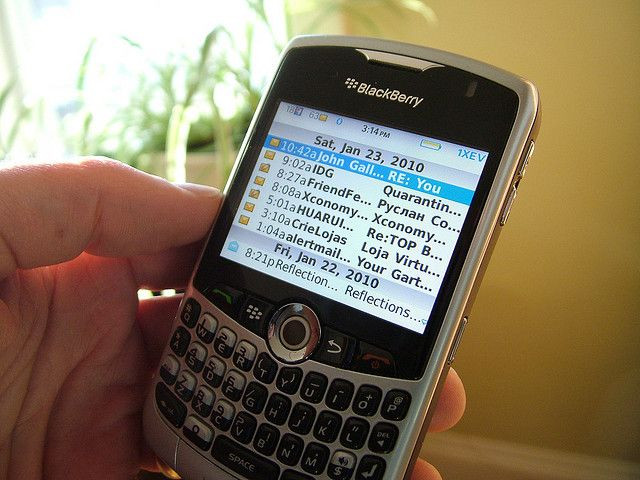You've Got Mail: Email Push Notifications After Work Raise Anxiety, Stress Levels

Technology makes it easy for us to check our laptops, tablets, and smartphones for emails long after we've left the office. Although it can be used in lieu of an in-person meeting, or to work remotely, constantly being plugged in eventually takes a toll on our personal life. Email notifications are useful, but it also compromises our health by raising our anxiety and stress levels, according to a recent study.
The study, presented at the Center at the British Psychological Society's Division of Occupational Psychology annual conference in Nottingham, England, suggests our well-intentioned habits and need to feel in control is actually achieving the opposite. "Our research shows that email is a double-edged sword. Whilst it can be a valuable communication tool, it's clear that it's a source of stress of frustration for many of us," said Dr. Richard MacKinnon, from the Future Work Center, in the news release.
To observe the effects of emails before and after-work hours, MacKinnon and his colleagues surveyed approximately 2,000 workers in a variety of industries, sectors, and job roles in the UK, about their experience of using email. Technology, behavior, demographics, and personality were explored to determine whether it played a role in workers' perception of email pressure, and in their subsequent coping strategies.
The findings revealed there was a strong relationship between using "push notifications" and perceived email pressure. Ironically, people who reported push notifications to be useful also displayed the highest levels of email pressure; the higher the pressure, the more negative effects it had on home life, and vice versa. This email pressure was highest among managers and younger people, but it steadily decreased with age.
Workers in IT, marketing, public relations, the Internet and media were most affected by email stress. More than 30 percent of this group received more than 50 emails a day, while more than 65 percent allowed their devices to update emails 24/7, leading to higher levels of anxiety and stress. This coincides with 2014 statistics that found the average adult spent more than an hour a day consulting emails, while an estimated 196.3 billion emails were sent around the world.
However, a worker's personality can be a moderator between perceived email pressure and work-life balance. In the recent study, those who ranked their own ability and sense of control over their environment lower were more likely to let work interfere with their home life, and vice versa.
A similar 2015 study explored how being continuously connected comes at a cost to our health. Researchers delved into the concept of how "telepressure" — the urge to respond immediately to work emails, no matter the time — can re-expose employees to workplace-related stressors. Employees who succumbed to telepressure were more likely to be sleep deprived, burnt-out, and have more health-related absences from work. Interestingly, the study found telepressure is a workplace problem, not a worker problem. Researchers suggest this behavior is either learned from our colleagues' behavior or from the social dynamics of a particular work environment.
So, how do we unplug?
The researchers advise people to not check their email early in the morning and late at night, and plan our day before checking emails. Furthermore, they encourage turning off push notifications or disabling the email app altogether during certain hours of the days.
It's worth noting this isn't a one-size fits all approach, given varied personal perceptions of stress and workplace policies and procedures. What may work for some may not work for others, but it's all about finding our own good work-life balance.
Sources: MacKinnon R et al. How you manage your emails may be bad for your health. British Psychological Society. 2016.
Barber LK and Santuzzi AM. Please respond ASAP: Workplace telepressure and employee recovery. Journal of Occupational Health Psychology. 2015.
Published by Medicaldaily.com



























